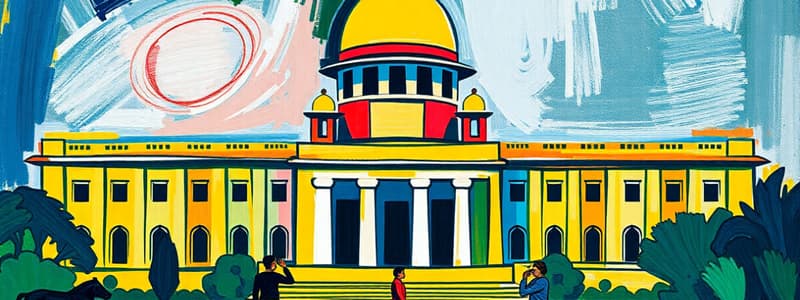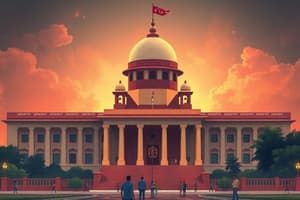Podcast
Questions and Answers
The judiciary is the third branch of the ______.
The judiciary is the third branch of the ______.
government
The Supreme Court is the highest court of the Indian ______.
The Supreme Court is the highest court of the Indian ______.
judiciary
The Supreme Court is located in ______.
The Supreme Court is located in ______.
Delhi
A judge of the Supreme Court must have been a judge in a High Court for at least ______ years.
A judge of the Supreme Court must have been a judge in a High Court for at least ______ years.
The chief justice and judges of the Supreme Court serve until they complete ______ years of age.
The chief justice and judges of the Supreme Court serve until they complete ______ years of age.
The Supreme Court has three kinds of jurisdiction: original, appellate and ______.
The Supreme Court has three kinds of jurisdiction: original, appellate and ______.
Original jurisdiction refers to the right of the Supreme Court to hear a case for the ______ time.
Original jurisdiction refers to the right of the Supreme Court to hear a case for the ______ time.
A Supreme Court judge can only be removed on grounds of proven ______, misuse of power and incapacity.
A Supreme Court judge can only be removed on grounds of proven ______, misuse of power and incapacity.
The Supreme Court of India has the power of judicial ______.
The Supreme Court of India has the power of judicial ______.
A ______ is a formal written order issued by a court.
A ______ is a formal written order issued by a court.
A judge of the High Court may hold office until the age of ______.
A judge of the High Court may hold office until the age of ______.
The ______ Court deals with civil cases and criminal cases at the state level.
The ______ Court deals with civil cases and criminal cases at the state level.
The writ of ______ corpus is issued when a person is detained illegally.
The writ of ______ corpus is issued when a person is detained illegally.
Subordinate courts include the District and Sessions Courts and the ______ Panchayats.
Subordinate courts include the District and Sessions Courts and the ______ Panchayats.
Judges of the High Court are appointed in consultation with the chief justice of the Supreme ______.
Judges of the High Court are appointed in consultation with the chief justice of the Supreme ______.
The Supreme Court acts as a court of ______, meaning its rulings are recorded permanently.
The Supreme Court acts as a court of ______, meaning its rulings are recorded permanently.
A ______ is issued when a public authority fails to perform a duty.
A ______ is issued when a public authority fails to perform a duty.
The appointment of district judges is made by the ______ in consultation with the High Court.
The appointment of district judges is made by the ______ in consultation with the High Court.
Flashcards are hidden until you start studying
Study Notes
Judiciary Overview
- The judiciary is the third branch of government responsible for interpreting laws, punishing law violators, and protecting citizens' rights.
- Consists of three levels: Supreme Court, High Courts, and Subordinate Courts.
The Supreme Court
- Established as the highest court in India, located in Delhi; serves as a central government branch.
- Responsible for interpreting the Constitution and laws, with binding judgments.
Composition and Structure
- Comprised of the Chief Justice and 30 other judges.
- Chief Justice appointed by the president on the advice of the Council of Ministers.
- Other judges appointed by the president, based on recommendations from the Council of Ministers and Chief Justice.
Qualifications for Judges
- Must be an Indian citizen.
- Have served at least five years as a High Court judge or ten years as an advocate in a High Court.
- Recognized as a distinguished jurist by the president.
Terms of Office
- Judges serve until the age of 65; cannot be removed by the president unless impeached.
- Impeachment requires a two-thirds majority vote in both houses of Parliament on grounds of misbehavior or incapacity.
Powers and Functions
-
Jurisdictions include original, appellate, and advisory.
- Original jurisdiction: First hearings in disputes involving states or issues of public importance.
- Appellate jurisdiction: Reviews cases from High Courts upon appeal.
- Advisory jurisdiction: Advises the president on laws and can review bills before presidential assent.
-
Judicial review enables the Supreme Court to evaluate the constitutionality of laws and executive orders.
-
Operates as a court of record, maintaining permanent records of proceedings and judgments.
Issuing Writs
- Authorized to issue writs for legal actions:
- Habeas Corpus: Protects against illegal detention; mandates presentation of detained individuals in court.
- Mandamus: Directs public officials to perform their duties when they fail to do so.
High Court
- Heads the state-level judiciary, led by a Chief Justice and additional judges as appointed by the president.
- Judges must have held a judicial office or practiced as advocates for at least ten years.
- Can issue writs and oversee subordinate courts in the state.
Subordinate Courts
- Include District and Sessions Courts, Provincial Courts, and Nyaya Panchayats.
- Handle civil (e.g., property, contract disputes) and criminal cases (e.g., theft, murder).
- Governed by the High Court of each state, ensuring uniformity in structure and functions across the country.
Studying That Suits You
Use AI to generate personalized quizzes and flashcards to suit your learning preferences.




